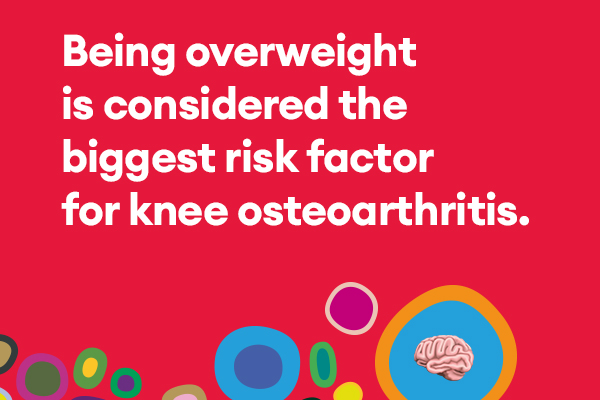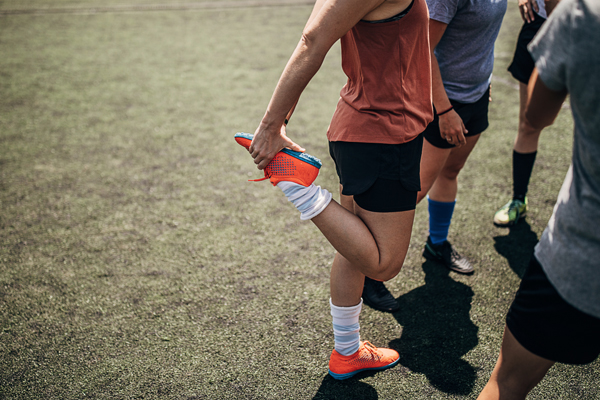Written by Medibank
July 2023
Most of the joints in your body, including your knees and your hips, belong to a group of what’s called ‘freely movable’ joints. Their job is to keep you in motion, so when they’re working well, it can be easy to take them for granted – you walk, they move. Simple.
However, when joint pain occurs, it can be a different story, leading to everything from mild inconvenience and stiffness to experiencing potentially life-altering difficulty moving around and completing daily activities.
It’s great if you’ve decided to do what you can now, at a time when your joints are still behaving well, to help prevent joint health problems later. Let’s call it investing in your healthy joint future.
Here, you’ll find the answers to the most common questions about joint health, to help you decide what you want to do and read about next.

What causes poor joint health?
There are a range of different things that can impact joint health, including conditions such as arthritis and bursitis, experiencing a joint-related injury or something called ‘occupational overuse’, where your job involves performing repetitive joint-loading movements or actions.
Ageing can also be a factor because as we grow older the amount of lubricating fluid inside our joints naturally decreases and the cartilage that lines and cushions the joints gets thinner, too. Combined, this can cause joints to become stiffer and less flexible.
It’s also true that something as simple as a lack of regular exercise or movement may contribute to deteriorating joint health.
How can I improve my joint health?
There are plenty of things you can do to support and improve your joint health.
On its own, physical activity has been shown to be beneficial because movement helps to keep the joint’s lubricating fluid moving and may also help to preserve that all-important cartilage. Plus, exercise can help to build strength in your muscles, which can improve joint stability, and that’s key.
Achieving and maintaining a healthy weight is also a good idea. And if you smoke, consider quitting, with research suggesting there’s a link between smoking and a quicker deterioration of cartilage.
What are the best exercises for joint health?
While exercises that build your overall fitness are always good for your health and wellbeing, strength-building activities are particularly helpful for your joints.
This is because stronger muscles help to stabilise joints. For example, the quadriceps muscle at the front of the thigh acts as a natural brace for the knee, impacting how stable the knee joint is, as well as the loading on that joint.
It’s also a good idea to incorporate activities that improve and maintain the flexibility of both your joints and the muscles that surround them, such as stretching and yoga.
Fortunately, there are many activities and exercises that are good for joint health, including hip health and knee health, that can build strength, flexibility and general fitness at the same time. If you need some inspiration to get moving, check out Live Better at Home.
What foods improve joint health?
Some research shows that eating a diet which has an anti-inflammatory effect on the body may be beneficial for joints, bearing in mind that chronic, low-grade inflammation can be a factor in the development of osteoarthritis.
Research also shows that some anti-inflammatory dietary patterns may protect against being overweight and may also make maintaining a healthy weight after weight loss easier to achieve. This is important, considering weight is one of the lifestyle factors that can affect joint health – not only does carrying too much weight add ‘excess loading’ to weight-bearing joints such as the knees, fatty tissue also has an inflammatory effect on the joints.
Anti-inflammatory diets tend to be rich in fruits, vegetables and legumes, as well as olive oil and oily fish, and low in ultra-processed, refined foods.
Are there supplements for joint health?
There are a few different joint health supplements available, with common ingredients including things such as glucosamine and chondroitin and omega-3 fish oils.
However, it’s important to bear in mind that research remains mixed on the effectiveness of joint health supplements. For example, while research suggests that high-dose fish oil supplements may help to reduce joint inflammation in rheumatoid arthritis, the evidence to support the benefits of glucosamine and chondroitin is lacking. While there are some claims that supplements containing those ingredients can help to reduce osteoarthritis pain, high-quality studies show little or no benefit.
Can you avoid getting arthritis?
There are actually more than 100 different types of arthritis, and many have risk factors that you can’t control or modify, such as your genetics, but there are some risk factors that you can change and work on.
Not only is it a misconception that the most common type of arthritis, called osteoarthritis, is an inevitable, unavoidable part of ageing, Arthritis Australia says that up to 70 per cent of osteoarthritis is actually preventable.1
Two of the most important osteoarthritis prevention strategies include avoiding joint injuries and maintaining a healthy weight.
How much weight should I lose to help my joints?
Those who are already at a healthy weight may not benefit as much from weight loss, but in general terms, every little bit counts.
While being overweight is the biggest risk factor for knee osteoarthritis, for every 1kg of body weight lost, it takes up to 4kg worth of pressure off the knee joint.2
People who are very overweight are twice as likely to develop knee osteoarthritis than people who aren’t.3
For advice and recommendations around weight loss, talk to your doctor.


Live Better at Home
At Medibank, we know that caring for yourself helps you to care for those around you. That’s why we’ve created Live Better at Home.
We're encouraging all Australians to join our daily Eat, Move and Feel activities that will help us all stay active, stay healthy and Live Better at Home.
Read more about taking care of your joints
Looking for something else?
Visit Joint health for more information.
1 Arthritis Australia; Time to Move: Osteoarthritis; retrieved May 2023
2 NPS Medicinewise; Osteoarthritis: an opportunity to promote weight loss with patients; retrieved May 2023
3 NPS Medicinewise; Osteoarthritis: an opportunity to promote weight loss with patients; retrieved May 2023
Things you need to know
While we hope you find this information helpful, please note that it is general in nature. It is not health advice, and is not tailored to meet your individual health needs. You should always consult a trusted health professional before making decisions about your health care. While we have prepared the information carefully, we can’t guarantee that it is accurate, complete or up-to-date. And while we may mention goods or services provided by others, we aren’t specifically endorsing them and can’t accept responsibility for them. For these reasons we are unable to accept responsibility for any loss that may be sustained from acting on this information (subject to applicable consumer guarantees).




